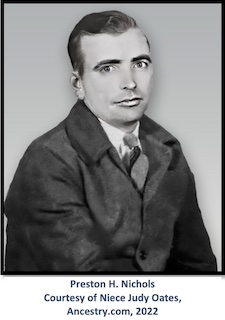 Technican Five Preston Henry Nichols
Technican Five Preston Henry Nichols
United States Army, World War II
Company F, 143rd Infantry Regiment, 36th Infantry Division
 April 26, 2023 - Preston Henry was born on May 7th, 1918, just six months before the end of World War I, or the World War as it was known as at that time. He was the youngest child of eight born to Eveline Carlton and William Ambrose Nichols in Many, Louisiana which is the parish seat of Sabine Parish in western Louisiana. His Mother passed away three weeks after his birth and the 1920 census documents his father William as a widower with Preston and three of his siblings, Bertha (16), Allen (13), and Willie (7) living with him in Precinct 1, Sabine Parish, where he is employed as a laborer in a lumber mill. Life was no doubt hard and became more difficult with the Great Depression arriving in 1929. At this time Preston, age 12, and his father along with brother Willie, age 16, were living with his older brother Sam, age 23, and his wife on a farm in the East Hamilton community of Shelby County, Texas.
April 26, 2023 - Preston Henry was born on May 7th, 1918, just six months before the end of World War I, or the World War as it was known as at that time. He was the youngest child of eight born to Eveline Carlton and William Ambrose Nichols in Many, Louisiana which is the parish seat of Sabine Parish in western Louisiana. His Mother passed away three weeks after his birth and the 1920 census documents his father William as a widower with Preston and three of his siblings, Bertha (16), Allen (13), and Willie (7) living with him in Precinct 1, Sabine Parish, where he is employed as a laborer in a lumber mill. Life was no doubt hard and became more difficult with the Great Depression arriving in 1929. At this time Preston, age 12, and his father along with brother Willie, age 16, were living with his older brother Sam, age 23, and his wife on a farm in the East Hamilton community of Shelby County, Texas.
Coming out of the depression, war was on the horizon, and the United States instituted the first peacetime military draft registration in its history. On October 16th, 1940, the Selective Service Act required all males between the ages of 21 to 35 to register, and Preston now age 22 complied by completing his registration card (D.S.S. Form 1) in Milam, Sabine County, Texas where he was employed by the government work relief program called the Civilian Conservation Corps (CCC). He listed his home address as that of his father’s, RFD # 2, Shelbyville, Texas. Physically he was described as white, five foot five inches tall, 140 pounds with blue eyes and blonde hair. As an aid to identification in the event of an emergency, a knuckle that was knocked back on his right hand was listed.

Entry into World War II for the United States was still ten months away when Preston was inducted into the US Army on January 31st, 1941 in Houston, Texas. His enlistment record listed him with a grammar school education and the civilian occupation of a farmer. It noted that he planted, cultivated, and harvested cotton, corn, truck, and feed crops on a 300-acre farm. He also drove teams, tended livestock, and worked in partnership with his father.
 Following the oath of enlistment where he became US Army Private Nichols, serial # 38051680, Preston was sent to Camp Bowie just southwest of Brownwood, Texas for 13 weeks of basic training. Following basic, he received advanced infantry training and was assigned the Military Occupation Specialty (MOS) of 076, Automatic Rifleman. This training taught him how to load and fire an automatic rifle to provide firepower support to his unit. Upon completion, he could also use hand weapons, including rifle, automatic rifle, rifle grenade launcher, bayonet, trench knife, and hand grenade, and was familiar with hand-to-hand fighting techniques. His WAGO Form 100, Army Separation Record documents that he held this MOS for fifteen months.
Following the oath of enlistment where he became US Army Private Nichols, serial # 38051680, Preston was sent to Camp Bowie just southwest of Brownwood, Texas for 13 weeks of basic training. Following basic, he received advanced infantry training and was assigned the Military Occupation Specialty (MOS) of 076, Automatic Rifleman. This training taught him how to load and fire an automatic rifle to provide firepower support to his unit. Upon completion, he could also use hand weapons, including rifle, automatic rifle, rifle grenade launcher, bayonet, trench knife, and hand grenade, and was familiar with hand-to-hand fighting techniques. His WAGO Form 100, Army Separation Record documents that he held this MOS for fifteen months.
It was about this time, May 1941, that his Father became concerned about the lack of letters from his son and contacted the Red Cross. Mr. Glen McCoy, Field Director investigated and responded to Mr. Nichols, “The boy tells us that he is in the best of health, and although he has been out on maneuvers, those periods are for only two or three days at a time. He gave as his reason for not writing the family that ‘he guessed he had been too busy, or something’. We pointed out that very naturally when his folks had not heard from him for so long, they would be worried. He replied that he guessed that was so. Pvt. Nichols told us that he [one line unreadable] … by this time they would have received his letter”. It is assumed that the family then did receive mail from Preston, and all was well again.
 Private Nichols was assigned to Company F, 143rd Infantry Regiment of the 36th Infantry Division (also known as the “Panther Division”, “Lone Star Division”, “The Texas Army”, or the “T-Patchers”. During World War I, the division consisted of National Guard units from Oklahoma and Texas but was now an all-Texas unit. Along with the Division, the 143rd moved to Mansfield, Louisiana, and took part in both the August and September 1941 Louisiana Maneuvers. Three months later the United States was part of World War II with the Japanese attack on Pearl Harbor, Hawaii, on December 7th, 1941, and the German declaration of war against the United States four days later. The division then moved to Camp Blanding, Florida, on February 19th, 1942, and participated in the Carolina Maneuvers between July 9th, and August 15th, 1942. They were then staged at Camp Edwards, Massachusetts for their port call to the European Theater of Operations (ETO).
Private Nichols was assigned to Company F, 143rd Infantry Regiment of the 36th Infantry Division (also known as the “Panther Division”, “Lone Star Division”, “The Texas Army”, or the “T-Patchers”. During World War I, the division consisted of National Guard units from Oklahoma and Texas but was now an all-Texas unit. Along with the Division, the 143rd moved to Mansfield, Louisiana, and took part in both the August and September 1941 Louisiana Maneuvers. Three months later the United States was part of World War II with the Japanese attack on Pearl Harbor, Hawaii, on December 7th, 1941, and the German declaration of war against the United States four days later. The division then moved to Camp Blanding, Florida, on February 19th, 1942, and participated in the Carolina Maneuvers between July 9th, and August 15th, 1942. They were then staged at Camp Edwards, Massachusetts for their port call to the European Theater of Operations (ETO).

While waiting for movement overseas at Camp Edwards, Preston was selected to become a Cook, MOS 060, and completed six weeks of cook schooling before departing with the division from the Port of New York on April 2nd, 1943. During their time in Europe, the 143rd Regiment participated in:
1. Salerno & Liri Valley, Italy: They landed on the beach at Salerno, Italy during Operation Avalanche on September 9th, 1943, and continued to fight in Italy during the campaign in the Liri Valley from then to early 1944. Significant engagements included the Battle of San Pietro and the Rapido River crossing.
Six months following Preston’s arrival in Europe his father received a Western Union telegram, from Washington D. C., dated October 5th, 1943, stating, “I regret to inform you that the Commanding General North African Area reports your son Private First Class Preston H. Nichols missing in action since eleven September. If further details or other information of his status are received you will be promptly notified…The Adjutant General”. Fortunately, the family did not have to wait long because twenty-five days later, William received another telegram from the Adjutant General telling him “I am pleased to inform you that your son Private First Class Preston H. Nichols who was previously reported missing in action returned to duty twenty-four September”. This was followed by a telegram from Preston himself telling them, “Please don’t worry all well and safe. Good luck, P. Nichols.”

His daughter Billie also had a recollection of Preston’s during this time and wrote, “Preston Nichols told of how when his company came ashore that they were fired upon by friendly fire (I don’t know what country) [Salerno Italy]. He and his buddy, Robert Nowell were lost for two weeks in enemy territory. They found enough wild fruits and vegetables from people’s gardens to keep them alive. They had been given a password. When they encountered a group of soldiers and said “Tennessee” and they replied ‘Walker’, they knew that they were safe.
2. Anzio: The regiment was landed to reinforce the Fifth Army on May 19th, 1944, and then participated in the breakout and movement to Rome where they were halted by orders to allow other units to catch up.
During this downtime, Preston penned a letter to his father dated May 8th, 1944. In his own handwriting It read, “Dear Dady. Will drop you a few line to let you know that I am still OK hope to fine you the same. Dady I am sorry that I haven’t rote you before now but I’ve been party busy. Dady when you don’t here don’t worry about me for it will be all OK and just don’t have time to rite. Well Dady I don’t know any thing to rite. Anser soon tell all hello for me and don’t worry. As ever your son Preston”.
3. Southern France: As part of the 36th Division, the 143rd landed in Southern France in August 1944. Moving forward with the 141st Infantry, the regiment was part of the bottleneck that formed the Colmar Pocket that destroyed the German 19th Army.
Preston’s father passed away on August 29th, 1944 at the age of seventy-eight but unfortunately, service personnel at that time could not return home and in many cases notification was a slow process.
4. Vosges, France, and Germany: The 143rd concluded its combat with actions in Vosges, France, and southern Germany. There was a significant battle near Weikersheim, Germany. The regiment then breached the Siegfried Line and moved forward as far as the Rhine River.
Victory in Europe (VE Day) was declared on May 8th, 1945. The 143rd Infantry suffered 9,000 casualties, captured 75,000 German Army prisoners, five Congressional Medals of Honor were presented to members of the unit, and five Presidential Unit Citations were awarded for units of the Regiment. They served 386 days in combat.
Private Preston Nichols returned home to the United States ahead of his unit’s return [December 1945], aboard the British ocean liner, RMS Queen Mary that had been retrofitted to serve as a troop ship during WW II. They departed Greenock, Scotland on February 22nd, 1945, and arrived at the Port of New York on March 11th, 1945. His movement orders stated that upon arrival at the reception center in the United States, he was authorized a thirty (30) day recuperation at the address listed [Route 2, Shelbyville, Texas] and the recuperation time would not be applied against his furlough credit. The orders also stated that information of a military nature within this theater [European] will not be discussed in private or public and will not be disclosed by means of newspapers, magazines, books, lectures or radio, or any other method without prior clearance through the WD [War Department] Bureau of Public Relations or the appropriate Public Relations Officers of Army installations. Preston was then honorably discharged on May 12th, 1945, four months before World War II was officially over in the Pacific. He served four years and four months of military service and was awarded the Army Good Conduct Medal, American Defense Service Medal, American Campaign Medal, European-African- Middle Eastern Campaign Medal with four bronze service stars, and the World War II Victory Medal.

During his time in the Army, Preston struck up a good friendship with a fellow cook by the name of Flavius “Fla” B. Hall, who was from North Carolina. He wrote a great story about Preston that appeared in the Fighting 36th Historical Quarterly in the spring of 1986.

“My first recollection of Cpl. Nicholas (also known as Little Nick) was in 1942 during the North Carolina Maneuvers when I was a ‘new’ cook for Co F 143rd. Nick taught me how to light the garbage can (gasoline) heaters. Later at Camp Edwards on Cape Cod, a heater “blew up” while attempting to light up – in his face. He was hospitalized several days for inhaling hot air into his lungs. A sad accident. Little Nick had the unique job of “fixing” anything the other troopers didn’t know how to fix. A real handy-dandy for Co F Kitchen.
When we were in North Africa, one morning we were eating our C Rations. I asked Little Nick, “why are you not eating?” He replied, “I stole mine last night while on guard duty”. I replied, “how could that happen”. Nick said “easy, I thought I was in your pup tent”. “Well Nick if you’d been in my tent, I’d be the one that would not be eating”. “Yep” he replied, “but since you wasn’t, gimme a sip of your coffee.”
The day after Thanksgiving in Italy, 1943, Little Nick and I carried down the chow on a muddy road. Unfortunately, we didn’t have a ‘splash lid’ on the fruit cocktail pot. We discovered about an inch of MUD on top of the fruit cocktail as we were getting ready to serve. Little Nick said “Hall, don’t get excited. I can fix it”. He poured 5 gallons of water into the cocktail to wash out the mud. He fixed it good! We then set up the chow line in a tent that Mess Sgt. Bob Nowell had installed the day before to serve the Thanksgiving dinner. The weary troopers came in a few at a time to eat when they returned from the front line.
We brought with us that day three replacements for Company F. One was Lt. Natan A. Hughes. Soon after his arrival, he crawled in to the tent (flaps were closed to hold in the light) where Bob Nowell, 1st Sgt Gennie Jones and five or six more were drinking coffee. Rookie Lt. Hughes stood up and said “done you soldiers know how to salute an officer? Can’t you see my rank?” Nowell calmly looked up and replied, “all I see is a shave-tail 2nd Louie, and they’re a dime a dozen ‘round here". After a few more remarks from the others, Lt. Hughes told Nowell to have someone get him a cup of coffee. Bob replied, “get your OWN coffee.” Hughes shot back with “I’ll have you court martialed!..then crawled back out of the tent. Little Nick followed him outside and shouted “Why you little dumb bastard, I can’t believe you can be that dumb…WHO do you think you are? Get your ass back and there and get your own coffee”. Lt. Hughes then replied, “I don’t have my canteen cup”. Nick shot back, “any of those dog-faces will LOAN you theirs.” They returned to the tent and Nick told the group, “the Lt. does NOT have his canteen cup”. First Sgt. Gennie Jones looks up, as he was eating his favorite bread and grape jelly and said “one of you guys let the Iron Man borrow your canteen cup.”
FROM THAT DAY… Lt. NATHAN A. HUGHES was known to his comrades as THE IRON MAN. He would become the most respected and best liked officer in Company F 143rd. He would later serve as COMMANDING OFFICER of Co. F. Later on, Hughes would tell his other officers that LITTLE NICK taught him MORE about combat conditions in the first five minutes than he was taught at OCS in six months. THE IRON MAN later was transferred to 36th Division Hqs. And wore the rank of Major at war’s end.
During our long association with each other, Nick and I would come under artillery or mortar fire while taking chow to the front lines. Nick would always say, “Hall, keep the goldurn Jeep rollin’, we ain’t scared of dim-dam bastard Krauts shells.”
One night, Little Nick and I set up the chow line in a barn yard. We learned it was located between our Co F lines and the Krauts lines. When the bullets began dancing around, ricocheting off the chow pots, we waited until it stopped, and made a fast withdrawal.
Little Nick had a lot of compassion for his fellow man. In a combat zone, he exhibited a great deal of courage and bravery. He would often ‘volunteer’ his services, no matter how hazardous or dangerous the duty would be. Many times after supplies were delivered, Nick would crawl from one foxhole to another, telling a joke and giving his moral support to his comrades, adding his brand of sunshine to the troops.
Soon after the Southern France Invasion, Nick’s health had declined slightly, plus news from home that his father passed away. In February 1945, Sgt. Bob Nowell recommended that he be transferred stateside.
Nearly 40 years later, I made my ‘first 36th Reunion in Houston in 1982 and the first person I asked about was Little Nick. Bob Nowell informed me that Nick had passed in April of ’82 due to lung cancer. Looking back, in the short time I was associated with Cpl. PRESTON H. NICHOLES he became one of my most cherished buddies. Nick will always be remembered by those of us who knew him. He was an outstanding soldier.”

Returning to Shelby County following his discharge, Preston and Miss Betty Ann Waldrop were married on Saturday, November 23rd, 1946. They started the life of farming in the East Hamilton Community and were blessed with six daughters; Sherry, Karen, Billie (Stanley), Wanda (Yarborough), Louise (Wall), and Erna (Williams), along with four sons; Drew, Benjamin “Shorty”, James, and Dan. Sadly, Drew, Sherry, and Karen all passed away in childhood. The family never moved from their farm although Preston did later work for E. L. Bruce Company where he retired from in May 1981. He and his good friend Mess Sergeant Bob Nowell, who lived in Longview, Texas stayed in touch and saw each other from time to time. Unfortunately, at the age of 63, Preston died at the Veterans Administration Hospital in Shreveport, Louisiana eleven months later on April 17th, 1982.
Funeral services were arranged by Mangum Funeral Home in Center and Preston was laid to rest in the East Hamilton Cemetery of Shelby County, the community where he had lived most of his life. His wife Betty would join him there twelve years later in April 1994. Day is done, God is nigh.
Of the sixteen million men and women who served in World War II, there are at this writing, April 2023, less than 250 thousand alive today. All are well into their nineties, but they were once young, and in their youth, they truly saved the world. This is a fact that is forgotten and unappreciated by many Americans today. The “Greatest Generation” as they are called were incredibly special, and the likes of which will never be seen again.
I would like to acknowledge and thank Preston’s daughter, Billie Nichols Stanley for her help in putting his story together. The documents and information she provided were invaluable.
SOURCES:
(1) Year: 1920; Census Place: Justice Precinct 1, Sabine, Texas; Roll: T625_1842; Page: 11B; Enumeration District: 168
(2) Year: 1930; Census Place: Precinct 3, Shelby, Texas; Page: 13A; Enumeration District: 0008; FHL microfilm: 2342124
(3): Morgan, Richard. AUTOMATIC RIFLEMAN (746). https://militaryyearbookproject.org/references/old-mos-codes/wwii-era/army-wwii-codes/gunnery-and-gunnery-control/automatic-rifleman-746. Accessed 28 Mar. 2023.
(4): McCoy, Glen. Henry Preston Nichols, Co. F, 143 Infantry, Camp Bowie, Texas. May 1941.
(5): Lineage and Honors - 143rd Infantry Regiment. https://www.texasmilitaryforcesmuseum.org/36division/archives/143/143lin.htm. Accessed 28 Mar. 2023.
(6): “36th Infantry Division (United States).” Wikipedia, 22 Mar. 2023. Wikipedia, https://en.wikipedia.org/w/index.php?title=36th_Infantry_Division_(United_States)&oldid=1146058332.
(7): Year: 1945; Arrival: New York, New York, USA; Microfilm Serial: T715, 1897-1957; Line: 11; Page Number: 77
(8): Hall, Flavius. “‘Little Nick’ A Forgotten Soldier.” The Fighting 36th Historical Quarterly, vol. VI, no. 1, Spring 1986.
(9): Johnson County Clerk's Office; Denton, Texas; Smith County Marriage Records
(10): Grossman, S. J. Movement Orders, TD Group E355-10TD. European Theater of Operations, 22 Feb. 1945.









